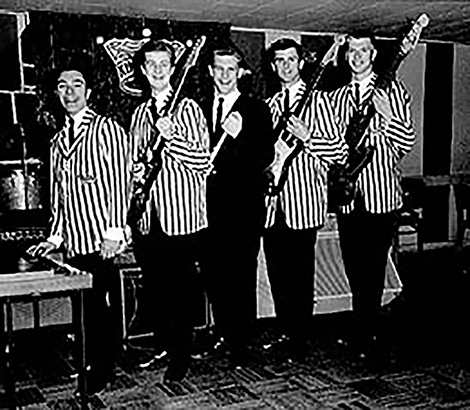On Nov. 9, 1963, The Kingsmen’s garage rock classic, “Louie Louie,†began its winter-long climb toward the top of Billboard magazine’s hit parade charts. But that rise was merely one leg of the journey that remarkable song was to make.
The “Louie Louie†saga actually began in 1957 when its author, the Los Angeles-based R&B singer Richard Berry, toured dancehalls through the Pacific Northwest. Sales of that record swelled in the wake of Berry’s tour, and several early local R&B talents, including the Dave Lewis Combo, The Gallahads, and The Thunderbirds, adopted it and established its popularity among young Northwest music fans.
Then in 1960, Tacoma’s seminal rock ‘n’ roll band, The Wailers (with their new singer, Rockin’ Robin Roberts), recorded a rendition of “Louie Louie†and released it as a single. The 45 became a radio hit, selling tens of thousands of units. From that point on, every teenage band in every Northwest town was expected to perform the song every night at every dance. It became no less than an ingrained regional social ritual for local teenagers.
Thus, it surprised few when a couple years later two Portland, Ore. bands, The Kingsmen and Paul Revere and the Raiders, opted to record their distinct renditions of that same song, at the very same recording studio (Portland’s Northwestern Recorders), the very same week. In April 1963, these two versions became concurrent radio hits in Portland. The upshot? Within weeks, the Raiders were “discovered†and signed to a major record deal with Columbia Records (leading to fame and two dozen big hits)
The Kingsmen, frustrated that their single had stalled without breaking out of Portland, split up. Their promoter, however, forged on, and by fall, he’d pushed the 45 into hit status on the East Coast. The band scrambled to reform (without, however, their original singer, Jack Ely) and were stunned to watch their recording debut in Billboard.
“Dirty” Lyrics or governmental hysterics?
But then, in early 1964, the media began carrying stories that The Kingsmen’s “Louie Louie†had been banned by Governor Matthew Welch of Indiana due to its allegedly “dirty†lyrics. The Seattle Post-Intelligencer reported that Welch “and broadcasting officials took immediate steps to have the record banned from Indiana radio stations. An investigation also was promised by the National Association of Broadcasters, and the U.S. Department of Justice and the Federal Communications Commission (FCC) were informed. James J. McManus, press secretary to the governor, said the words were ‘indistinct but plain if you listen carefully.’ â€
The initial outcry escalated to the point that U.S. Attorney General Bobby Kennedy took notice and the FCC and J. Edgar Hoover’s FBI launched investigations. The FBI’s dogged sleuths tracked down Richard Berry, The Kingsmen, the song’s publishers, the record company’s executives, all in a relentless effort to root out the presumed musical pornographers.
The Kingsmen were aghast. The “Louie Louie†they knew contained nothing more than the harmless original lyrical tale of a lonely sailor who was leaning on his bartender, Louie. But that’s not what a smattering of schoolkids — and their parents, principals, and preachers — figured they heard on the recording.
Ultimately, the FBI’s two-year investigation resulted in a 120-page report that — as it compiles all the various purported dirty lyrics that citizens provided the investigators — is not much more than a compendium of imagined filth. In the end, the entire brouhaha fizzled out when the FCC concluded — after conducting various technological analyses of the record — that it could not be considered pornographic because Ely’s vocals on the record were simply “unintelligible.â€
In no small measure due to the publicity surrounding the controversy, teenagers rewarded â€Louie Louie†with “top of the charts†status and ongoing sales figures that have topped 12 million. Beyond statistics, though, “Louie Louie†has achieved a naughty reputation that has ensured its status as the Northwest’s unofficial rock song, and its enshrinement in pop history. A major display about the song and its history was included in Seattle’s Experience Music Project’s (EMP) inaugural Northwest Passage exhibit upon opening in 2000.
This article, written by Peter Blecha,

originally was published at historylink.org, an online encyclopedia of Washington state history. Sources: Joel Whitburn, Top Pop Singles 1955-1993 (Menomonee Falls, Wis.: Record Research, Inc., 1994); Seattle Post-Intelligencer, 1964; Peter Blecha interviews with Richard Berry (1985), Dave Lewis (7/83, etc.), Ron Holden [Playboys] (9/83, etc.), “Tiny†Tony Smith [Gallahads] (9/84), Jack Ely [Kingsmen] (1982, etc.), Paul Revere [Raiders] (1986, 1999, etc.), Rich Dangle [Wailers] (1986, 1999, etc.).